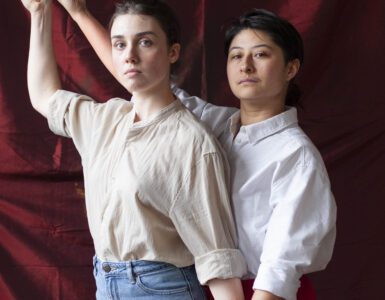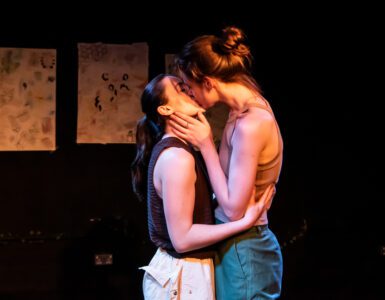Anyone could be a witch – it’s 17th Century in the North East of England, and the Witch Hunter is coming today. Suspicions are high about a grandmother called the Cunning Woman who makes ‘tonics’ and ‘cures’ on the outskirts of town, and a flower-obsessed girl who floats through the fields all day repeating rhymes. When the crops start to fail, and the men of the town encounter unexpected inconveniences, they begin to expect something more mysterious might be happening – but is any of it real, or just a channel for their deepfelt misogyny?
The piece conquers the myths upheld by the witch-hunters of the time with decisive lucidity, and makes them appear as incredulous and fanciful as the historical records suggest they were. The piece takes place in a fictional village in the North East of England that utilises fragments of research and fictionalisation of events from real witch trials that happened in Newcastle. Witch hunting was one of the original conspiracy theories, which turned into an embattlement with devastating consequences for the women accused, Menstrual Rage have crafted a deft and kaleidoscopic set of stories interrogating the horrific fates of these women.
In between a fleeting romance between the farmer’s son and the cunning woman’s granddaughter, we’re treated to the ephemeral pastoral sylvan upbringings of young women in the village. Playing with dolls, flittering through the fields, trying to make a living, the pressures to find a husband and get married else feeling they have no place in society. Even in the best of circumstances, these women are bound to lives defined by the men around them. But we shift focus to the depths of this misogynistic system soon enough, as Witch-Hunter General Matthew Hopkins arrives in town, and the blame for everything wrong in the world is saddled with these young women.
A large pink apparatus that seems to have been repurposed from a children’s playpark sits in the middle of the stage, bound in twine and ivy, with Chekhov’s rope dangling from the middle for the entirety of the piece. The women dart and dive around the apparatus for the duration of the show. It’s a fantastic centrepiece but does feel like at times it could have been used more effectively to establish levels during the piece where we see the younger women playing in the fields and streets of the village.
The performances range in their viscerality, some serving simply as comic relief, while others come across as extremely heightened representations that manage to keep you thoroughly entertained, and eventually give way to some unexpected depth. The performers all flick between playing caricatures of the men in the village and the women at the centre of the show, and this device is extremely effective in striking at the heart of the misogyny on display. Gemma Blake’s flitting between farmer’s son Thomas and fretful young girl Margaret is a highlight of the show, her mannerisms, vocal register, and facial expressions clearly delineate the characters while keeping both thoroughly entertaining, and Margaret evokes much sympathy from the audience.
Darcey Dawson-Taylor’s head-in-the-clouds Elizabeth is another scene-stealer. She seems to exist on a bit of a different plane to the other characters, and a concise, conclusive arc is created showing how this natural part of her personality is interpreted as supernatural by the men of the village. Her singing turns from a pastiche moment into a haunting, chilling, backdrop to the later parts of the story. Halfway through, Dawson-Taylor flicks into place as the Witch-Hunter General himself in a moment that begins as devastatingly funny, then reveals the misogynistic horror beneath it all precisely.
There is more than one unexpected musical moment that occurs in the show, and while the first one serves as an excellently timed sucker-punch to drag us into the first half, the one in the finale feels as though it detracts slightly from the abject horror created in the final scene before it. Menstrual Rage use the finale to explain that they’ve aimed to re-frame the narrative, but they needn’t worry about spelling it out, as we can see this ethos bleeding through the entire show already. The stark, grim final moment before the song would have served as a more impactful closing scene. Given the piece already caps off at seventy minutes, it feels like this would help tighten everything up.
All of the comedy lands perfectly, and chillingly underscores that more serious moments of the piece. It’s a deliciously well thought-through concept. While the narrative arc is relatively simple, it delivers a powerful resolve through Menstrual Rage’s ethos in asking us to see this time period through the eyes of the women who suffered its’ brutality. They have baked in several moments, and references, that ask us to draw their stories in comparison to misogyny in present-day society. While this could be developed with a little more clarity, it’s a bold and unforgiving message that leaves you thinking.
Loud, undaunting, stark, and throughout utterly hilarious all the while – these HELLCATS take the story of these supposedly “spiteful, hateful” women and breathe new life into their stories, dragging us into their shoes with a gut-punch.
Recommended Drink: A cocktail with elderflower liqueur, and a powerful spirit mixed in.
Catch HELLCATS tonight, 15th September, at Sweet @ Keiller Centre from 20:30. Tickets are available through the Dundee Fringe Box Office.
Hear the latest from Marginalised Voices from Fringes across the World
Subscribe to our Email Newsletter so we can send you insightful updates about unheard creative voices working to platform powerful stories. You'll be the first to hear about our content and how to apply to have shows you're working on reviewed.
Powered by EmailOctopus









